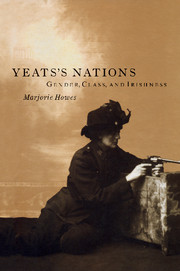Book contents
- Frontmatter
- Contents
- Acknowledgments
- List of abbreviations
- Introduction
- 1 That sweet insinuating feminine voice: hysterics, peasants, and the Celtic movement
- 2 Fair Erin as landlord: femininity and Anglo-Irish politics in The Countess Cathleen
- 3 When the mob becomes a people: nationalism and occult theatre
- 4 In the bedroom of the Big House: kindred, crisis, and Anglo-Irish nationality
- 5 Desiring women: feminine sexuality and Irish nationality in “A Woman Young and Old”
- 6 The rule of kindred: eugenics, Purgatory, and Yeats's race philosophy
- Notes
- Bibliography
- Index
5 - Desiring women: feminine sexuality and Irish nationality in “A Woman Young and Old”
Published online by Cambridge University Press: 06 July 2010
- Frontmatter
- Contents
- Acknowledgments
- List of abbreviations
- Introduction
- 1 That sweet insinuating feminine voice: hysterics, peasants, and the Celtic movement
- 2 Fair Erin as landlord: femininity and Anglo-Irish politics in The Countess Cathleen
- 3 When the mob becomes a people: nationalism and occult theatre
- 4 In the bedroom of the Big House: kindred, crisis, and Anglo-Irish nationality
- 5 Desiring women: feminine sexuality and Irish nationality in “A Woman Young and Old”
- 6 The rule of kindred: eugenics, Purgatory, and Yeats's race philosophy
- Notes
- Bibliography
- Index
Summary
The realm of sacred things is composed of the pure and of the impure. Christianity rejected impurity.
Georges BatailleTo-day the man who finds belief in God, in the soul, in immortality, growing and clarifying, is blasphemous and paradoxical.
(EX, 334)Yeats's aristocratic meditations and kindred politics offered Anglo- Irish nationality as a willful, arbitrary, imaginative response to the political and economic marginalization of the Anglo-Irish. In the years following the Anglo-Irish war, Yeats also engaged with a version of Irish nationality he associated with the newly hegemonic Catholic middle classes. The “Irishness” of the post-revolutionary Irish Free State was the subject of much debate and anxiety among members of the government, the Catholic church and society at large. During this period the version of postcolonial Irish nationality that emerged as dominant enforced Catholic social teachings and placed a heavy emphasis on gender roles and sexuality as important indicators of and potential threats to national identity. This chapter reads Yeats's representations of female personae and feminine sexuality in “A Woman Young and Old” as his response.
It may seem perverse to argue that “A Woman Young and Old” is, on some level, “about” Irish nationality; unlike Yeats's theatrical theories or Anglo-Irish poems, the sequence does not thematize the question of nationality explicitly. It is customary in Yeats criticism to contrast The Tower's embittered engagement with politics and The Winding Stair's rejection of politics in favor of sensual pleasure and an all-accepting joy. Critics also commonly argue that Yeats's preoccupation with sex and female personae represents a rejection of his earlier idealized notions of womanhood and a withering into the naked truths of femininity and sexuality.
- Type
- Chapter
- Information
- Yeats's NationsGender, Class, and Irishness, pp. 131 - 159Publisher: Cambridge University PressPrint publication year: 1996



